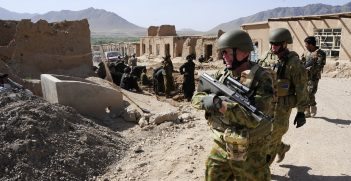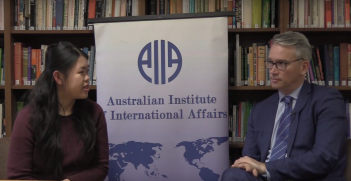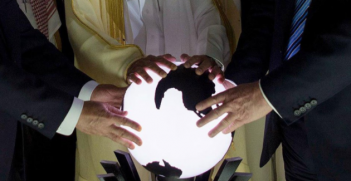Book Review: A Promised Land
Obama’s account of his movement from lower reaches of Democrat politics to the White House is compelling reading. It is well written, and best digested slowly, chapter by chapter, anecdote by anecdote.
The Australian public, having endured for four long years the abhorrent abuse of power and absurd tweets of Donald Trump and having watched the sickening spectacle of their prime minister fawning to him, might have expected Barack Obama’s renowned literary skills to deliver some mortal blows in the way only words can. But readers will find only a few mocking paragraphs about Trump (probably more than he deserves) in the 700 pages which comprise the first half of two volumes of recollections of an extraordinary presidency, told in colourful and gripping detail. It is rich in detail, with beautiful descriptions of the main actions and actors of the Obama years, laced with touches of nostalgia about a childhood on his grandma’s knee and all too brief holidays with his wife and daughters. As I am no longer able to read printed books, I listened to the audio version, read by Obama in his expressive and stylish voice. That was a huge bonus – as if the former president was telling his story from an armchair across the room.
There are moments of high drama. In the final chapter, Obama, alone in the Oval Office, agonised over whether to launch a lethal bomb-laden drone to take out the military compound in rural Pakistan where Osama bin Laden was hiding, or take the much riskier option of a helicopter gunship to fly an elite corps of Navy Seals from Jalalabad, Afghanistan. The mission would be to break into the property, locate Bin Laden, shoot him dead, and bring his corpse back to base for identification. The breathtaking final chapter brings to life the agony and the cool analysis which were at play.
Against the advice of his defence secretary, Obama opts for the Seals, accepting that if the operation were to fail, there would be lives lost and humiliation, but convinced that a drone strike that obliterated the building and all therein might make it impossible to identify the target. At no stage does Obama comment on or even mention the controversial report by Seymour Hersh in the New York Times that claimed the attack was a staged operation in cooperation with the Pakistan military, who had agreed to let the Seals into the building and kill the al-Qaeda leader in cold blood.
While this was the most dramatic and problematic decision described in the book, there were many other situations when Obama spent hours, even days, weighing up the pros and cons, realising that there are often no good choices and the only option was “making the best of bad choices.” He agonises over whether he is right to give up a lucrative law practice to enter politics in the Illinois senate, then whether to move to Washington, and after attracting attention as a black senator, whether to seek to become America’s 42nd president.
His inner conflict is not just between ever-present self-doubt and determined ambition. He is also torn between his political dreams and his love of his family, particularly the impact of his career on his wife and young daughters. Michelle Obama, a talented woman in her own right, has no desire for celebrity status and prefers to spend weekends with family and friends. When Obama tells her he thinks he will run for president, she cries “Why you Barack? Why do you need to be president?”
He replies, “I know that the day I raise my right hand and take the oath to be the president of the United States, the world will start looking at America differently. I know that kids all around this country — black kids, Hispanic kids, kids who don’t fit in — they’ll see themselves differently too… And that alone…that would be worth it.”
There was another reason which is unlikely to have been expressed at that moment. It goes back to his grandma in Hawaii, the scene of his childhood and favourite family holiday destination during the years he lived in Chicago and Washington. He writes: “She was the reason why, even in my most revolutionary moments as a young man, I could admire a well-run business and read the financial pages, and why I felt compelled to disregard overly broad claims about the need to tear things up and remake society from whole cloth. By my own estimation, my impact on the lives of poor children and their families so far had been negligible – even in my own country.”
There is much to read and like in this book, so many pen-pictures and profiles. Hillary Rodham Clinton’s name pops up frequently. She is described as sensible and shrewd. Obama had seriously considered her as his running mate, eventually deciding against it as he contemplated the idea of Bill as First Man “running round the West Wing.”
As we know, despite initial apprehension, he picked Joe Biden, describing him as a “decent, honest, loyal man, who might get prickly if he wasn’t given his due – a quality that might flare up when dealing with a much younger boss.” But Biden provides useful support at crucial moments in the narrative. He tirelessly sold the Senate on the Recovery Act, better known as Obamacare, played a vital role in debate and decision making on foreign policy, and paved the way for overseas forays.
Often a contrarian, Biden complemented Hillary as a sounding board for Obama, who wrote: “If I was seen as temperamentally cool and collected, measured in how I used my words, Joe was all warmth, a man without inhibitions, happy to share whatever popped into his head.” A decade and half later, observing President Biden, I wonder: could he have learned some skills from Obama?
Given the waves of revulsion that erupted following the killing of George Floyd by a policeman in Minneapolis and the resurgence of the Black Lives Matter movement at around the book’s publication date, some might have expected the book to reflect more on the anger of America’s first black president at overtones and undertones of racial injustice in the US. But Obama is careful to restate what he learned from his grandma: that America should and could be land of equal opportunity for all.
The memoir reveals few bursts of anger. Particularly memorable was when Obama addressed Congress as president. Convention has it that there are no interruptions, but when Obama was explaining why Obamacare would be open to undocumented immigrants, he writes: “Congressman Joe Wilson, red with racist fury, shouts ‘You Lie’ and in that moment he is partaking in that age-worn American tradition of a white man disrespecting a Black man even if that Black man is of a higher class.”
He expresses disappointment that Russian President Vladimir Putin’s body does not appear to live up to photographs. He accepts that Germany’s Angela Merkel was right to be initially sceptical of him because of his oratorical skills. He liked his predecessor, George W. Bush, while disagreeing with him about the invasion of Iraq. He appears to take a sideswipe at Tony Blair but gives fulsome praise to Gordon Brown who “lacked his predecessor’s political gifts but … was thoughtful, responsible and understood global finance.”
Obama is candid about his failed attempts to secure a peace agreement between Israel and the Palestinians and acknowledges that, although he was able to sit down with Benjamin Netanyahu and Mahmoud Abbas for face-to-face talks that broke down over Israeli settlements, the operation cost him Jewish votes in the mid-term elections. Obama describes himself as an admirer of Israel and a staunch supporter of Israel and its right to exist. At the time, he hoped to persuade Netanyahu to stop building settlements on the West Bank.
He is particularly critical of AIPAC, the US-based pro-Israel lobbying group with close links to Netanyahu, and which is thought to be responsible for a damaging media campaign against him, and supporting the emerging rise of Trump. We will doubtless hear more of this – and the evolution of America’s exceptionalism in foreign policy in the second volume.
Colin Chapman is a writer, broadcaster, and public speaker, who specialises in geopolitics, international economics, and global media issues. He is a former president of AIIA NSW and was appointed a fellow of the AIIA in 2017.





